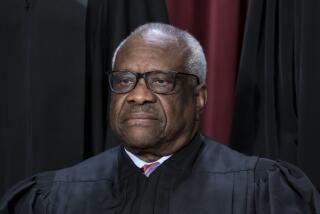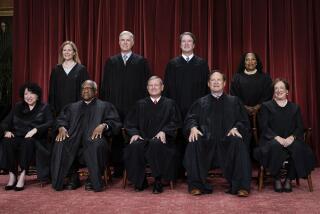Confirmation Is Justifiable; Withdrawal Is the Wiser Course : Having the votes to prevail in the Senate is not the same thing as doing what’s best for the country
No one could have wanted it to come out this way--mean, disturbing, divisive, ugly, even tragic. Hardly anyone seemed at their very best, and the political process was shown to be at its near-worst. Democrats will allege it was all the fault of President Bush, who in nominating controversial black conservative Clarence Thomas with such a thin record on the bench was too cynically clever by half. Republicans blame the Democrats, who they insist subjected this black nominee to a higher, double standard by leaking to the press an FBI report on alleged office sexual harassment in a campaign of character assassination. The reality--all partisanship aside--is that there is some truth in both assessments. Still, these last four days were a long, long way from our historical best.
I. THE ORDEAL OF TRYING TO JUDGE SEXUAL HARASSMENT:
In one sense the hearings were edifying for the insights they provided into what millions of victimized women are forced to confront and in many instances silently endure in the workplace. But at the same time the controversy has left almost everybody furious.
Perhaps the anger of women is most palpable. The basic charge--whose ultimate truth will probably never be known--was hardly unfamiliar to many working women. But here was the Senate Judiciary Committee at first appearing to shunt aside as trivial the painful allegations of the Oklahoma law professor--a woman, and a black. Then, trying to recover quickly, the committee appeared to embody every woman’s nightmare by conducting hearings that had Prof. Anita Faye Hill’s character in the docket as much as Judge Thomas’.
Ever wonder why only an estimated 4% of women who experience sexual harassment ever make the decision to complain--when anywhere from 25% to 40% of working women say they have experienced sexual harassment? Anyone in doubt about that had only to view the weekend’s proceedings.
Consider: Thomas’ witnesses, with the prompting of the senators who back the nominee, particularly Orrin G. Hatch (R-Utah) and Arlen Specter (R-Pa.), declared open season on Hill’s personal life; they discussed her dating habits, her social conversations with male and female friends, her living arrangements. But when the accused, Judge Thomas, declared his personal life off-limits, not one member of the Judiciary Committee had the temerity to challenge that ground rule.
That double standard is not, as women know, uncommon in the courtroom. Whether or not Thomas is approved to sit on the Supreme Court, the hearings, whatever educative value they might have had on the general subject of sexual harassment, may wind up sending the wrong message to working women: Suffer in silence.
II. THE UNEDIFYING CIRCUS THAT WAS THESE HEARINGS:
It’s true that sexual harassment charges can be hard to nail down. Eyewitnesses are rare; accusations typically come down to her word against his denial. The Senate Judiciary Committee, after fumbling the Hill charges badly, then opted for public hearings. But what hearings they were! The openness of a democracy is one of its enduring glories. But it can also be embarrassing.
The extraordinary Judiciary Committee hearings on the sexual harassment allegations directed against Judge Thomas were both fascinating and embarrassing. The long days of testimony and questioning were gripping as a raw dramatic conflict of almost classical dimensions. But in the end many turned away from this marathon spectacle not just distraught after all they had heard and seen but disturbed with how the inquisitorial process itself had unfolded.
Whether the hearings confirmed or changed earlier views, they left millions feeling sullied and saddened by what they had been exposed to. At the end of the original Thomas confirmation hearings last month, committee chairman Sen. Joseph R. Biden Jr. (D-Del.) announced that he planned to call new hearings to examine better ways for the Senate to determine the fitness of future nominees for the Supreme Court. This, keep in mind, was before anyone had heard of Anita Hill or the long parade of witnesses who were soon to appear to attest to her character or to Clarence Thomas’.
Behind Biden’s determination was a frustration and an anger that is by no means confined to the Judiciary Committee; it is perceived across the whole of the political spectrum. For the feeling has grown that something has gone very wrong with the way the confirmation process is conducted, in part, no doubt, because something has gone very wrong with the way Presidents choose nominees for the Supreme Court.
The entire process has become politicized--ideologized might be a more apt description--to an extent unheard of in modern times. That politicization has encouraged a nastiness--a win-at-all-costs philosophy, a disrespect for privacy--that demeans everybody it touches.
Was there, on the immediate issue, a better way to examine Prof. Hill’s allegations against Judge Thomas? At some point in the hearing Biden suggested that it may have been a great mistake to air issues of such intimacy and sensitivity in a public forum; certainly, at a minimum it was inexcusably unfair to many involved. Maybe a more perceptive committee and staff might have been able to avoid much of the problem in the first place. Perhaps a preliminary, closed-door hearing might have sorted out some of the issues, and witnesses, in advance. These are the kinds of issues that the promised future hearings might want to examine.
III. THE DIFFICULT QUESTION OF JUDGE CLARENCE THOMAS:
Under the American system, a person is innocent until proven guilty. Although a political hearing is not the same thing as a court proceeding, nonetheless it would be wrong to suggest that a charge is tantamount to the truth, that the accused is required to prove a negative or that the airing of an allegation can be permitted to have the same political effect as a proven crime.
For this reason many senators who would have voted for Thomas prior to Hill’s allegations might well feel justified maintaining their support; whereas senators who were opposed to Thomas for political, ideological or jurisprudential reasons will not of course feel compelled to change their mind.
For its part, The Times on Sept. 24 came to the same basic conclusion as the American Bar Assn., which found the nominee to be “qualified”--though not “well qualified”--for the high court. Changing that basic view would seem a logical error if based solely on charges that--however heinous, grave and disgusting--remain unproven. That would give the lie to the presumption of innocence.
No doubt the White House thinks it has the votes--and thus will go for a showdown tally today. Some will argue that would be the just outcome. It’s true that it wouldn’t be for the good of the country for a candidacy to be terminated because of an accusation alone. That could be a fatal precedent, an incentive to character assassination in the future. Indeed, from that perspective the hearings served a necessary purpose: The testimony did not prove Thomas guilty. But the hearings did create a very large question about Thomas, going beyond the harassment accusation. They seem to have left Thomas--who excoriated his critics not only for racism but indeed for sexism, given the racial and sexual stereotyping of him that he perceived--bitterly angry, so mortally wounded. Can this man render dispassionate judgments on issues before the court brought by groups that opposed him? That’s the doubt.
Therefore, the President would serve the country well by withdrawing the nomination.
“If I’m not confirmed,” said Judge Thomas on Saturday, “(I’ll) continue my job as a Court of Appeals judge, and hopefully live a long life, enjoy my neighbors and my friends, my son, cut my grass, go to McDonald’s, drive my car, and just be a good citizen, and a good judge, and a good father, and a good husband. Yeah, I’ll survive.”
That, in our view, is what Thomas should now do--return to the Court of Appeals. The best resolution to this tragedy is not to proceed apace with the Thomas candidacy as if nothing so extraordinary has happened. It has--and it has cast a long shadow over Thomas that could linger as long as he would sit on the high court. It is unlikely Thomas could ever cast a vote, much less render a written opinion, on issues pertaining to women without many citizens remembering the allegations. And that would only further fuel the bitterness.
It is time for the President to rise above the acrimony and partisanship. President Bush should find someone else--and he has many fine choices--to nominate for the court and allow Clarence Thomas to return to his important job on the Court of Appeals. That is clearly preferable to having Thomas head off to the high court with such an overarching cloud over his head.
Bush, or Thomas, should take the nation out of its misery and, for the good of the country, rise above the controversy.
More to Read
Get the L.A. Times Politics newsletter
Deeply reported insights into legislation, politics and policy from Sacramento, Washington and beyond. In your inbox three times per week.
You may occasionally receive promotional content from the Los Angeles Times.










